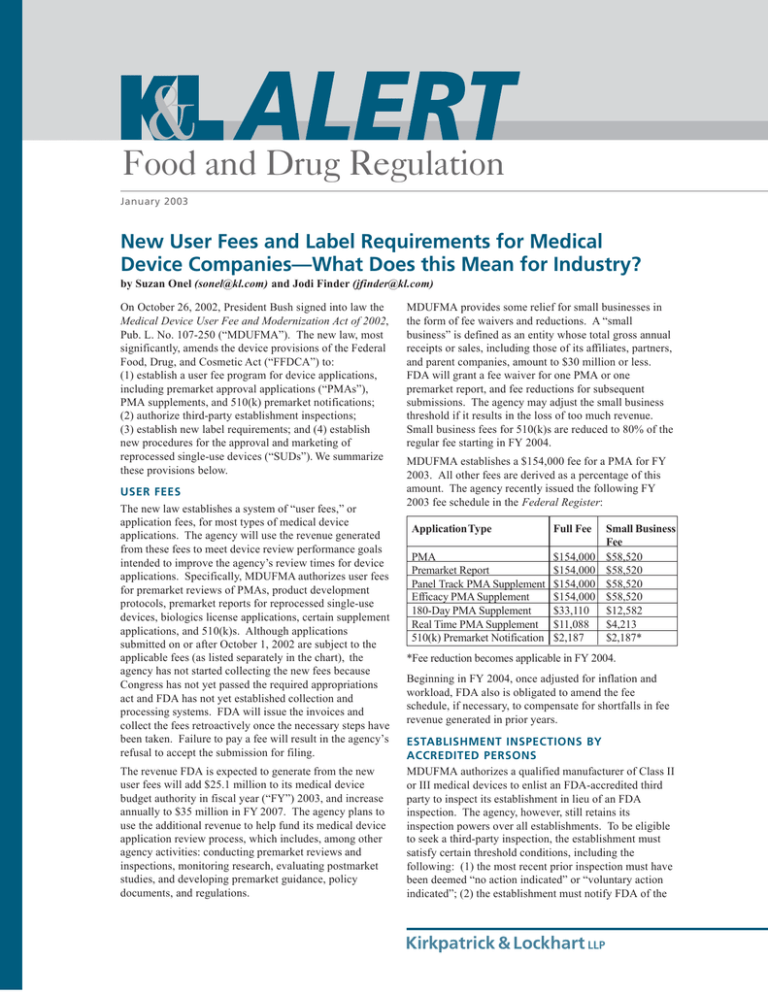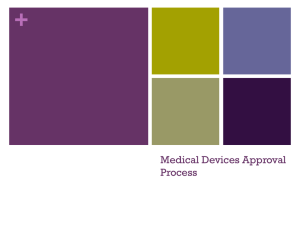
Food and Drug Regulation
January 2003
New User Fees and Label Requirements for Medical
Device Companies—What Does this Mean for Industry?
by Suzan Onel (sonel@kl.com) and Jodi Finder (jfinder@kl.com)
On October 26, 2002, President Bush signed into law the
Medical Device User Fee and Modernization Act of 2002,
Pub. L. No. 107-250 (“MDUFMA”). The new law, most
significantly, amends the device provisions of the Federal
Food, Drug, and Cosmetic Act (“FFDCA”) to:
(1) establish a user fee program for device applications,
including premarket approval applications (“PMAs”),
PMA supplements, and 510(k) premarket notifications;
(2) authorize third-party establishment inspections;
(3) establish new label requirements; and (4) establish
new procedures for the approval and marketing of
reprocessed single-use devices (“SUDs”). We summarize
these provisions below.
USER FEES
The new law establishes a system of “user fees,” or
application fees, for most types of medical device
applications. The agency will use the revenue generated
from these fees to meet device review performance goals
intended to improve the agency’s review times for device
applications. Specifically, MDUFMA authorizes user fees
for premarket reviews of PMAs, product development
protocols, premarket reports for reprocessed single-use
devices, biologics license applications, certain supplement
applications, and 510(k)s. Although applications
submitted on or after October 1, 2002 are subject to the
applicable fees (as listed separately in the chart), the
agency has not started collecting the new fees because
Congress has not yet passed the required appropriations
act and FDA has not yet established collection and
processing systems. FDA will issue the invoices and
collect the fees retroactively once the necessary steps have
been taken. Failure to pay a fee will result in the agency’s
refusal to accept the submission for filing.
The revenue FDA is expected to generate from the new
user fees will add $25.1 million to its medical device
budget authority in fiscal year (“FY”) 2003, and increase
annually to $35 million in FY 2007. The agency plans to
use the additional revenue to help fund its medical device
application review process, which includes, among other
agency activities: conducting premarket reviews and
inspections, monitoring research, evaluating postmarket
studies, and developing premarket guidance, policy
documents, and regulations.
MDUFMA provides some relief for small businesses in
the form of fee waivers and reductions. A “small
business” is defined as an entity whose total gross annual
receipts or sales, including those of its affiliates, partners,
and parent companies, amount to $30 million or less.
FDA will grant a fee waiver for one PMA or one
premarket report, and fee reductions for subsequent
submissions. The agency may adjust the small business
threshold if it results in the loss of too much revenue.
Small business fees for 510(k)s are reduced to 80% of the
regular fee starting in FY 2004.
MDUFMA establishes a $154,000 fee for a PMA for FY
2003. All other fees are derived as a percentage of this
amount. The agency recently issued the following FY
2003 fee schedule in the Federal Register:
Application Type
Full Fee
PMA
Premarket Report
Panel Track PMA Supplement
Efficacy PMA Supplement
180-Day PMA Supplement
Real Time PMA Supplement
510(k) Premarket Notification
$154,000
$154,000
$154,000
$154,000
$33,110
$11,088
$2,187
Small Business
Fee
$58,520
$58,520
$58,520
$58,520
$12,582
$4,213
$2,187*
*Fee reduction becomes applicable in FY 2004.
Beginning in FY 2004, once adjusted for inflation and
workload, FDA also is obligated to amend the fee
schedule, if necessary, to compensate for shortfalls in fee
revenue generated in prior years.
ESTABLISHMENT INSPECTIONS BY
ACCREDITED PERSONS
MDUFMA authorizes a qualified manufacturer of Class II
or III medical devices to enlist an FDA-accredited third
party to inspect its establishment in lieu of an FDA
inspection. The agency, however, still retains its
inspection powers over all establishments. To be eligible
to seek a third-party inspection, the establishment must
satisfy certain threshold conditions, including the
following: (1) the most recent prior inspection must have
been deemed “no action indicated” or “voluntary action
indicated”; (2) the establishment must notify FDA of the
Kirkpatrick & Lockhart LLP
inspector’s identity and the agency must agree to the
selection of that person; (3) the establishment must market
at least one device both in the U.S. and abroad; and
(4) the inspector must be certified, accredited, or
otherwise recognized by a foreign country. The
manufacturer is responsible for paying the third-party
inspector.
purpose of making them available for an additional single
use. Devices that are introduced into interstate commerce
as of January 26, 2004 will be required to bear the
following statement “prominently and conspicuously”:
Although the agency is not required to issue additional
criteria for third-party accreditation until April 2003,
MDUFMA contains minimum criteria for qualified
inspectors. An inspector: (1) may not be a federal
employee; (2) may not be owned by or affiliated with a
device manufacturer, supplier, or vendor; (3) may not be
involved in the design, manufacture, promotion, or sale of
any FDA-regulated products; (4) must follow generally
accepted business practices and adhere to certain
operating principles; and (5) may not have a financial
conflict of interest with respect to any FDA-regulated
products. Finally, MDUFMA requires the agency to
maintain a complete list of approved inspectors on the
Internet.
The new law further authorizes FDA to require certain
SUDs to submit additional data to demonstrate safety and
effectiveness. In addition, the agency may revoke existing
510(k) exemptions for critical or semi-critical reprocessed
SUDs if such action is necessary to provide a reasonable
assurance of safety and effectiveness. Finally, MDUFMA
creates a new type of application, a “PMA report,” for
Class III reprocessed SUDs that are not eligible for 510(k)
clearance.
MANUFACTURER IDENTIFICATION
Effective in April 2004, a medical device must bear the
manufacturer’s identity. This must appear “prominently
and conspicuously” on the device itself or attached to it in
one of the following forms: (1) the manufacturer’s name;
(2) a generally recognizable abbreviation of the
manufacturer’s name; or (3) a unique and generally
recognizable symbol that identifies the manufacturer.
FDA may waive the identification requirement if it is not
feasible for the particular device or would somehow
compromise its safety or effectiveness.
OTHER ADDITIONAL REQUIREMENTS
MDUFMA also includes a number of provisions to
address “reprocessed single-use devices” (“SUDs”). The
law defines these products as devices that are intended for
one use, or used on a single patient during a single
procedure (“single use”), and then subjected to additional
processing and manufacturing (“reprocessing”) for the
Reprocessed device for single use.
Reprocessed by [name of reprocessing
manufacturer].
Other interesting aspects of the new legislation include
provisions relating to electronic labeling for prescription
devices, electronic establishment registration, and modular
PMA submissions.
If you have any questions about the new requirements,
please contact Suzan Onel (202.778.9134 or
sonel@kl.com), Jodi Finder (202.778.9044 or
jfinder@kl.com), or any member of the Food and Drug
Practice.
Authors’ Note: On February 25, 2003, the U.S. Food and
Drug Administration announced that it will begin
collecting the user fees imposed by the Medical Device
User Fee and Modernization Act of 2002 (“MDUFMA”)
(Pub. L. 107-250). See 68 Fed. Reg. 8773 (Feb. 25, 2003)
available for viewing at http://a257.g.akamaitech.net/7/
257/2422/14mar20010800/edocket.access.gpo.gov/2003/
pdf/03-4490.pdf. Throughout March and April 2003, FDA
will issue invoices for device notifications and
applications submitted between October 1, 2002 and
March 31, 2003, and will require payment within 30 days
of those invoices. For device notifications and
applications submitted on or after April 1, 2003,
applicants will be required to pay the user fees upon
submission.
Kirkpatrick & Lockhart’s Food & Drug Practice offers comprehensive legal and regulatory counseling to companies and other
organizations regulated by FDA under the Federal Food, Drug, and Cosmetic Act. The Food & Drug Practice represents
manufacturers and distributors of food, dietary supplement, pharmaceutical, medical device, personal care and cosmetic products,
and products of biotechnology, as well as trade associations, individuals and institutions involved in clinical research of FDAregulated products.
PARTNERS
Suzan Onel
Donald R. Stone
Gary L. Yingling
202.778.9134 sonel@kl.com
202.778.9067 dstone@kl.com
202.778.9124 gyingling@kl.com
ASSOCIATES
Ann M. Begley
Rebecca L. Dandeker
Jodi Finder
Michael H. Hinckle
202.778.9365
202.778.9409
202.778.9044
202.778.9296
abegley@kl.com
rdandeker@kl.com
jfinder@kl.com
mhinckle@kl.com
OF COUNSEL
Emalee G. Murphy 202.778.9428 emalee.murphy@kl.com
®
Kirkpatrick & Lockhart LLP
Challenge us.®
www.kl.com
BOSTON
DALLAS
HARRISBURG
LOS ANGELES
MIAMI
NEWARK
NEW YORK
PITTSBURGH
SAN FRANCISCO
WASHINGTON
.........................................................................................................................................................
This publication/newsletter is for informational purposes and does not contain or convey legal advice. The information herein
should not be used or relied upon in regard to any particular facts or circumstances without first consulting a lawyer.
© 2003 KIRKPATRICK & LOCKHART LLP.
ALL RIGHTS RESERVED.


